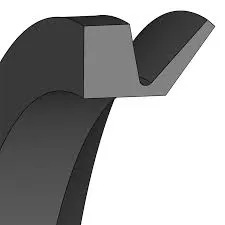9 月 . 30, 2024 10:51 Back to list
Innovative Approaches in Oil Seal Production for Enhanced Performance and Durability
The Significance of Oil Seal Manufacturing in Modern Industries
Oil seals, also known as fluid seals, are critical components in various machinery and equipment across multiple industries. These seals are designed to retain lubricants and prevent the entry of contaminants, ensuring the smooth operation and longevity of machinery. Given the pivotal role they play, the manufacturing of oil seals has become a specialized field, focusing on innovation and precision to meet the diverse needs of modern applications.
Understanding Oil Seals
An oil seal typically consists of a cylindrical structure made from elastomers, metals, or a combination of materials. The primary purpose of an oil seal is to prevent leakage of oil and other fluids while preventing dirt and debris from entering the machinery. They are used in numerous applications, including automotive engines, hydraulic systems, and industrial machinery. The efficiency of oil seals directly impacts the overall performance and reliability of these systems.
The Manufacturing Process
The manufacturing of oil seals involves several critical steps, including material selection, molding, machining, and quality control. Each step is essential in ensuring that the final product meets the stringent standards required for various applications.
1. Material Selection The first step in manufacturing oil seals is selecting the appropriate materials. Common materials include nitrile rubber, fluorocarbon rubber, silicone, and polyurethane. The choice of material depends on factors such as temperature resistance, chemical compatibility, and abrasion resistance, which are crucial for the seal's performance in specific environments.
2. Molding Once the material is selected, the next step is the molding process. This process typically involves compression molding or injection molding techniques. During compression molding, raw materials are placed into a mold cavity, heated, and pressed to form the desired shape. Injection molding, on the other hand, involves injecting molten rubber into a preheated mold. Both methods require precision to ensure consistent dimensions and quality.
3. Machining After the initial molding, some oil seals may require machining to achieve tighter tolerances or specific features. This step can involve cutting, grinding, or milling certain parts of the seal. The objective is to enhance the seal's performance by ensuring a perfect fit within the assembly.
oil seal manufacturing

4. Quality Control Quality assurance is a critical aspect of oil seal manufacturing. Manufacturers employ various tests, such as pressure tests, leak tests, and dimensional inspections, to ensure that each oil seal meets the required specifications. Adopting stringent quality control measures minimizes the risk of seal failure, which can lead to costly downtime and repairs in machinery.
Innovations in Oil Seal Manufacturing
The oil seal manufacturing industry is continuously evolving, driven by advancements in materials science and engineering. Innovations such as the development of new elastomer compounds have led to the creation of seals that can withstand extreme temperatures and harsh chemicals. Additionally, manufacturers are increasingly adopting automation and robotics in the production process, improving efficiency and consistency.
Moreover, the industry is witnessing a growing emphasis on sustainability. Many manufacturers are exploring eco-friendly materials and processes to reduce their environmental impact, responding to the increasing demand for sustainability in all areas of production.
The Importance of Quality Oil Seals
The reliability of oil seals is paramount in preventing fluid leaks, which can lead to operational failures and increased maintenance costs. High-quality oil seals enhance the efficiency and reliability of machinery, ultimately contributing to the bottom line for businesses. In sectors such as automotive, aerospace, and manufacturing, where precision and performance are critical, investing in quality oil seals is not just beneficial but essential.
Conclusion
In conclusion, oil seal manufacturing plays a crucial role in the functioning of modern machinery across industries. The meticulous process of selecting materials, molding, machining, and ensuring quality control is fundamental to producing high-performance oil seals. As industries continue to evolve, the importance of innovation and sustainability in oil seal manufacturing will remain vital. High-quality oil seals not only ensure the longevity and efficiency of machinery but also contribute significantly to the operational success of businesses worldwide. Thus, understanding the nuances of oil seal manufacturing is essential for those involved in product design, engineering, and maintenance in various sectors.